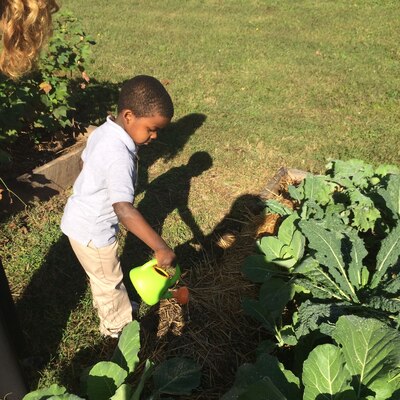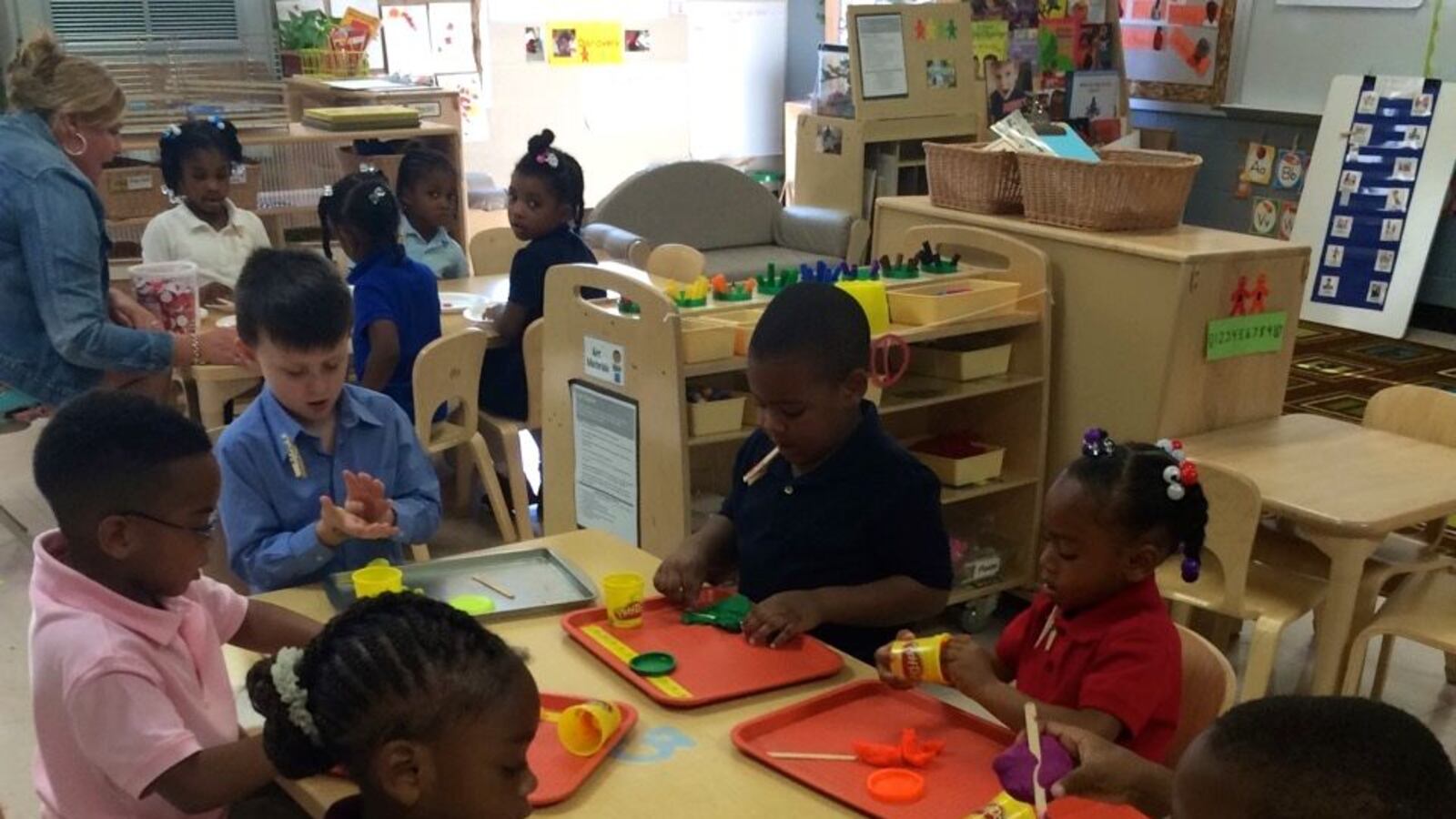Policymakers angling to dump pre-kindergarten programs in Tennessee might not be impressed initially with how 4-year-olds at Bordeaux Early Learning Center spent their first day back from fall break in Nashville: hip-hop dancing, painting with pine cones, and picking peppers in their school garden.
But pre-K advocates say such activities teach youngsters the academic and behavioral skills necessary for later grades. They say the resulting positive school environment also addresses many problems with Tennessee’s public pre-K classroom highlighted by a landmark study released last month by Vanderbilt’s Peabody College of Education.
The five-year study found that students who attended Tennessee’s public pre-K programs eventually did worse in elementary school than their peers who had no pre-K at all.
In the aftermath, Gov. Bill Haslam and lawmakers openly pondered divesting from the state program known as Voluntary Pre-K. Meanwhile, in Washington, a proposal before Congress would end a federal grant funding pre-K in school systems across the nation, including five districts in and around Nashville and Memphis.
Even so, early childhood educators and advocates in Tennessee are stubborn in their commitment to early learning programs.
They say the study’s findings were anticipated, and that changes have been implemented in the last two years to address weaknesses highlighted by the report. They also are helping to spread best practices to pre-Ks across the state.
"Things I thought were right were not developmentally appropriate, but I had no way to know they weren't."
Danielle Norton, instructional coach
Danielle Norton, a career pre-K teacher now coaching younger teachers at Bordeaux, said it’s been a learning experience for everyone who’s committed to quality pre-K.
“The past year I’ve grown a lot,” she said. “Things I thought were right were not developmentally appropriate, but I had no way to know they weren’t. Now we have coaches and principals who know so much about early childhood education. But before, we didn’t have that in Tennessee.”
Learning curve
Tennessee’s Voluntary Pre-K was spearheaded by Gov. Phil Bredesen in 2005, answering a call from researchers and educators to serve low-income students as 4-year-olds to get them on equal footing with their more affluent peers by kindergarten. Statewide enrollment jumped from 9,000 students during its pilot year to 18,000 within three years, a number that has since remained steady.
However, developing a high-quality pre-K program was not the initial focus. Pre-K teachers often were viewed more like babysitters than educators. And though state pre-K classrooms frequently are located in elementary schools, they were treated as separate entities. Researchers and pre-K teachers think that might be why any developmental gains made in pre-K were quickly lost.
“A lot of principals don’t understand early childhood [education],” Norton said. “They just think it’s cute. You pretty much got left alone. There was no one to support me or help me grow as an educator.”
In their study of the Voluntary Pre-K initiative, Vanderbilt researchers Dale Farran and Mark Lipsey found that children who went to pre-K did better than their peers in kindergarten, but that their academic performance flattened out by the second and third grades.
They noted that pre-K teachers often had wildly different approaches, so that best practices weren’t being shared and spread to make pre-K worth the public investment.
And even when pre-K teachers were guiding young learners in developmentally appropriate ways — letting them learn while playing, allowing constant movement, and letting students lead the way, rather than responding to teacher lectures — their counterparts in kindergarten through third grade often were not. Thus, many proponents of pre-K say a transition to mediocre early elementary school programs may be equally to blame for the Vanderbilt study’s disappointing findings.
“You absolutely have to have that bridge from kindergarten to third grade to keep that momentum,” said Dana Eckman, Metro Nashville’s director of early childhood learning. “You can’t look at one year as a silver bullet. Every year matters.”
Addressing quality
In the fall of 2014, Metro Nashville Public Schools launched three model pre-K centers, including Bordeaux, where Vanderbilt researchers offer feedback on what practices are helping children learn and what practices aren’t. District leaders then help disseminate that information to the 174 classrooms across the school system, 55 of which are Voluntary Pre-K classrooms, and 10 of which were part of the Vanderbilt study.
By design, there are few quiet moments at Bordeaux.
When children walk down the hall to learn hip-hop with the nonprofit Global Education, or go outside to garden with Plant the Seed, another nonprofit organization, they often are singing or snapping their fingers. That’s because of coaching that teachers receive to keep students engaged during transition times between activities. A simple activity like clicking fingers seems fun to 4-year-olds, and helps them develop fine motor skills.

The teachers also have been coached to speak with children in warm and friendly tones and to create more spaces that encourage kids to play together.
This year, all Nashville district pre-Ks are using The Creative Curriculum, which incorporates playtime as a way to learn and was piloted last year in the model pre-Ks.
And for the first time this year, all Nashville pre-K teachers have access to professional development and to 17 instructional coaches, such as Norton.
The Nashville district has used a federal pre-K grant, which will infuse $33 million into the program over the next four years, to hire six family services specialists, an extended learning coordinator and a data specialist to track pre-K students outcomes in later grades.
“We’re focusing not just on the school day, but the whole child,” Eckman said.
All of the changes have meant a paradigm shift for pre-K teachers, with a greater focus on assessing student skills — just by observing basics such as playing, counting, and how a child holds a pencil.
“They don’t know they’re being assessed. They’re playing,” said Kathy Daws, who has taught in Nashville for more than 30 years. “Everything is very intentional now.”
Planting their feet
Though federal and state pre-K funding is under threat, pre-K advocates are adamant that they’ll keep pushing and say they have a lot of support. Both Memphis and Nashville recently elected mayors who favor pre-K for all children, not just those who are from low-income families. At the state level, Education Commissioner Candice McQueen identifies early education as a priority in her strategic plan for the state. She also has named an Early Learning Council.
Nashville is luring early educators from across the country, including Eckman, who moved this spring from California, and Diana Lyon, the principal of the Bordeaux program, who relocated from Ohio.
In Memphis, Shelby County Schools is making changes that leaders hope will put pre-K on the map — and keep it in the budget.
“A lot of things are already happening in our pre-K classrooms that I think will reap results,” said Barbara Prescott, the city’s longtime pre-K advocate. “I think we have the ability to really make a positive difference.”
"A lot of things are already happening in our pre-K classrooms that I think will reap results."
Barbara Prescott, pre-K advocate
In recent years, the Tennessee legislature has turned back cost-saving bills that would scale back pre-K to summer programs. However, such proposals are likely to resurface next year in the wake of the Vanderbilt study.
Still, Shannon Hunt, who heads the Nashville Public Education Foundation, says support for pre-K is strong in a city seeking to improve the quality of its schools and its workforce.
“In Nashville, we have made a real priority out of pre-K,” she said. “I don’t see that changing given the extraordinary high-need population we serve.”

